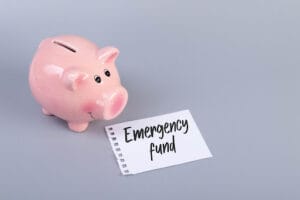You already know that preparation and planning are critically important, especially when it comes to your personal finances. It surprises you pleasantly when things go better and allows you to manage difficult situations easily.
Murphy’s law is also about unexpected financial situations. In this article, we’ll discuss how this law applies to saving money and you can use it to prepare yourself financially to deal with emergencies.
What is Murphy’s Law and How is it Applied to Saving Money?
Murphy’s law states, “Anything that can happen, will happen” or “if anything can go wrong, it will”. The primary idea behind this law is that if there’s a probability/possibility of something negative happening, then sooner or later it will happen.
Additionally, the law also says that negative things happen at the worst possible time. Most of us encounter situations when we’re extremely tight on funds and some unexpected expense comes up. For example, you use all your retirement savings to buy stocks but the stock market goes down or crashes.
While Murphy’s law isn’t always true, you should always be prepared for the worst. You can use this law as a planning tool or reminder to save money.
How to Prepare Yourself for Murphy’s Law?
Dave Ramsey, a personal finance expert, has devised a formula to prepare yourself for Murphy’s law. It consists of seven small steps that allow you to save money and effectively prepare for the future. Here’s a list of those seven steps that you can use to deal with Murphy’s law.
Step 1: Save Up a Small Emergency Fund
The first step is to save up at least $1,000 as an emergency fund. Dave Ramsey recommends that you save up this money before you begin paying your current debts to protect yourself against Murphy’s law.
When anything that can go wrong, will go wrong, then at least a $1,000 emergency fund must be there. It’ll allow you to pay for small unexpected expenses and you won’t need to use your credit card and avoid additional debt.
The best way to have an emergency fund is to create a savings account and send some money each month in it. You can also set up an automatic monthly transaction if you want. It will send money from your checking account to your savings account each month as soon as you receive your salary.
Step 2: Pay Off Your Debts
Once you have set up a savings account for your emergency fund, the next step is to pay off all your debts as soon as possible. Start paying off your debts (except for the mortgage) from the lowest to higher balance, irrespective of the interest rate they have.
It’s important to note that many financial experts suggest that you should pay off your debts by starting from the highest amount. However, Dave Ramsey says that you should start with the lowest one as it’ll be easy to pay off. This strategy will allow you to see results quickly and help you stay motivated to continue paying your debts.
Step 3: Set Up a Big Emergency Fund
Once you have $1,000 in your savings account as an emergency fund and you have paid all your debts except for the mortgage, you need to start beefing up your emergency fund account. It should have enough funds to cover at least three months’ worth of living expenses.
The total amount of money you should have in that account depends on your monthly expenditures. For example, if you need $2,000 to spend a month, you’ll need to save at least $6,000 in your emergency fund account.
These funds will also start generating passive income if you have placed them in a savings account. However, the purpose of beefing up your emergency fund is not to earn money. Instead, it is to help you cover your expenses if you fall victim to a financial emergency, such as losing your job or a medical crisis.
Make sure that you don’t use a single penny from these funds when you can live without it. Keep it there as insurance for you and your family for unexpected incidents.
Step 4: Invest for Retirement
Once you reach step 4, you will have no outstanding debt to pay and there will also be a handsome amount of money in your savings account. At this point, you’ll need to start saving money to secure your future.
You should invest at least 15 percent of your gross income into a retirement plan of your choice. Investing less money than that would be a bad plan because you’ll need to feed yourself when you get retired.
Step 5: Save Something for Your Children’s Education
According to Dave Ramsey, you should start saving money for your children’s education once you have saved up enough money for your retirement. Afterall, your children’s degree won’t feed you once you retire.
While you might feel a little selfish when following this strategy, there are many different ways to pay for your kids’ education. They can also perform better and get different types of scholarships. But consuming all your resources for this purpose won’t help you survive during your retirement period.
You’ll need to set a well-defined goal to save money to cover the education of your kids. A great strategy is to determine how much money you’ll need and then divide it by the number of months you have. It’ll provide you with the exact amount of money that you need to save up each month.
Step 6: Pay Off Your House
When everything is going on track with education and retirement savings, you’ll find it easy to pay off your house early. If you have some extra money that you earned from your investments or any other means, consider using it to pay off your mortgage as soon as possible.
You’ll need to get into the same intense state of mind that you followed while paying off your debts. It’ll help you complete your mortgage payment early so that you own your house.
It’ll take you one step closer to your financial freedom where you won’t need to worry about any house payments. You’ll feel motivated when you know that having absolutely no outstanding payments at all is completely possible and it’s within your reach.
Step 7: Earn More and Help
Once you have covered yourself for emergencies, paid off all your debts, saved up money for retirement children’s education, and cleared your mortgage, you’ll have financial freedom. At this stage, you’ll find it easy to save more money and use it to make yourself and other people happy.
It’ll keep you stress-free and help you feel accomplished and satisfied with your life. Make sure that you don’t start hoarding money as it won’t help you build wealth. So, consider investing your excess money to earn more money and start helping other people to achieve the same.
Final Words
While Murphy’s law deals with people in bad financial situations, you can use it to prepare yourself for the worst. You only need a positive mindset and the right strategy to start saving money to secure your present and future.
We hope this guide helped you understand how Murphy’s law applies to saving money and how you can prepare yourself for it.



